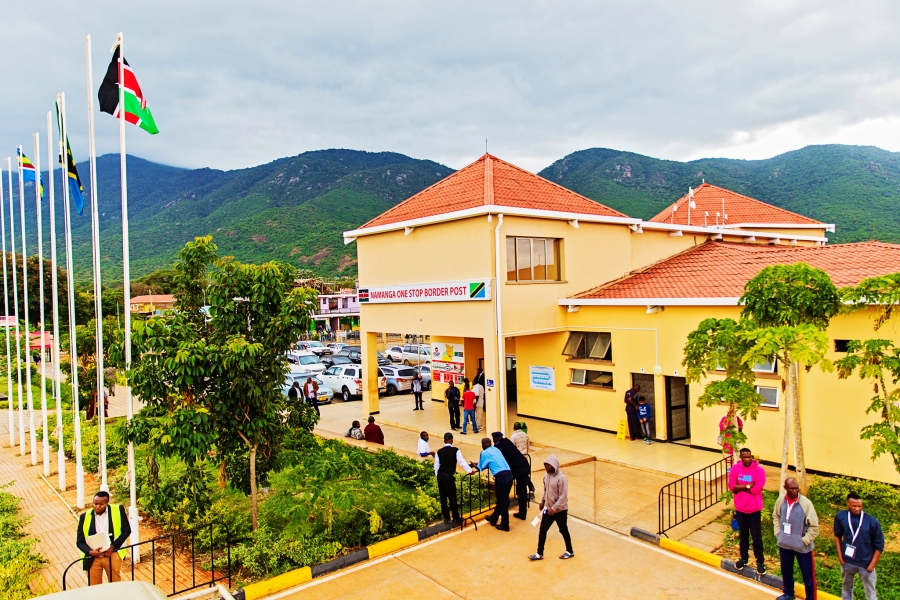
EAC targets One Stop Border Posts' staff tp prevent the spread of COVID-19 in the region
East African Community Headquarters, Arusha, Tanzania, 16 September 2020: Border Posts are high-risk areas regarding the spread of COVID 19 and other infectious diseases from one country to another. These “Points of Entry” are at the center of movement of people, animals and goods from one country to another.
The capacity of border post staff to prevent the spread of the virus and to quickly and expertly respond to infections in people who cross the border determines the efficiency. “The region has started opening its borders and space to allow movement of travelers in the region. This involves a risk as the pandemic has not yet ended”, says Hon Christophe Bazivamo, the Deputy Secretary General Productive and Social Sectors at the East African Community (EAC) Secretariat. To minimize this risk, the EAC will convene a training of trainers at 12 “One Stop Border Posts” (OSBPs) in the region to enhance the capacity of staff for infection prevention and for communicating the COVID-related risks to travelers.
Human mobility across borders has exacerbated the spread of COVID 19 within the EAC region and beyond. It is hence pertinent and a matter of urgency that in addition to the measures already established, all staff of various sectors at the border posts are trained in the prevention of COVID 19. This will enable them to protect themselves effectively, while engaging with people at large scale. At the same time, it implements one of the key interventions of the EAC COVID 19 response plan.
The EAC Secretariat with support from the German Government through the Deutsche Gesellschaft für Internationale Zusammenarbeit (GIZ) GmbH has engaged AMREF Flying Doctors (AFD) to conduct the emergency intervention trainings for about 330 staff in total at 12 OSBPs in the region, covering all Partner States.
The training aims to enhance surveillance, prevention of and response to the spread of COVID 19 in and out of the Partner States. The target group for the training of trainers are border post stakeholders with close contact to travelers and/or their luggage, as well as to animals and goods. This includes staff from port and animal health, customs, immigration, revenue officers, luggage handlers, clearing agents, standards officers, border security and the joint cross-border management committees. By engaging sectors and professions beyond health, the project will also implement the One Health approach. It seeks to develop more robust emergency management systems and procedures while at the same time facilitating border post collaboration.
“AMREF Flying Doctors will offer a comprehensive training of trainers to enable the OSBPs to develop their own staff training and surveillance regimes” says Stephen Gitau, AFD Chief Executive Officer. “This will contribute greatly towards the pillar of enhanced safety for travelers and the duty of care of EAC and the OSBP management to their workers and border users.”
The training will enhance cooperation between the trainees from both sides of the border posts and thereby strengthen regional integration and joint understanding for the needs and special requirements of each of the two Partner States. It will enable the trained staff to communicate the risks related to COVID 19 in a scientifically sound and understandable manner to their customers/travelers and to sensitize them on the importance of protective measures for their own benefit and that of the people they interact with.
The 2-day trainings will be offered over a period of 12 weeks. Each class will have 16 participants, 8 from each side of the border, and will take into account social distancing requirements. Two classes will be trained at large OSBPs and one class at the smaller ones. The training is scheduled to start end of September 2020. Subsequently, the trained trainers will develop and conduct their own classes to roll-out their brief training sessions. AFD will support the process and monitor the progress.
The course design and curriculum development are based on the International Health Regulations, best practices of the World Health Organization and the US Centers for Disease Control as well as public health acts.
The OSBPs where trainings of trainers are planned are: Burundi-Rwanda (Nemba/Gasenyi), Burundi-Tanzania (Kobero/Kabanga), Kenya-Tanzania (Isebania/Sirari and Lunga Lunga/Hororo), Kenya-Uganda (Malaba and Busia), Kenya-Tanzania (Namanga), Rwanda-Uganda (Gatuna/Katuna and Kagitumba/Mirama Hills), South Sudan-Uganda (Nimule/Elegu), Tanzania-Rwanda (Rusumo) and Tanzania-Uganda (Mutukula).
- ENDS -
For more information, please contact:
Simon Peter Owaka
Senior Public Relations Officer
Corporate Communications and Public Affairs Department
EAC Secretariat
Arusha, Tanzania
Tel: +255 768 552087
Email: sowaka [at] eachq.org
About the East African Community Secretariat:
The East African Community (EAC) is a regional intergovernmental organisation of six Partner States, comprising Burundi, Kenya, Rwanda, South Sudan, Tanzania and Uganda, with its headquarters in Arusha, Tanzania.
The EAC Secretariat is ISO 9001: 2015 Certified
Tags: COVID-19